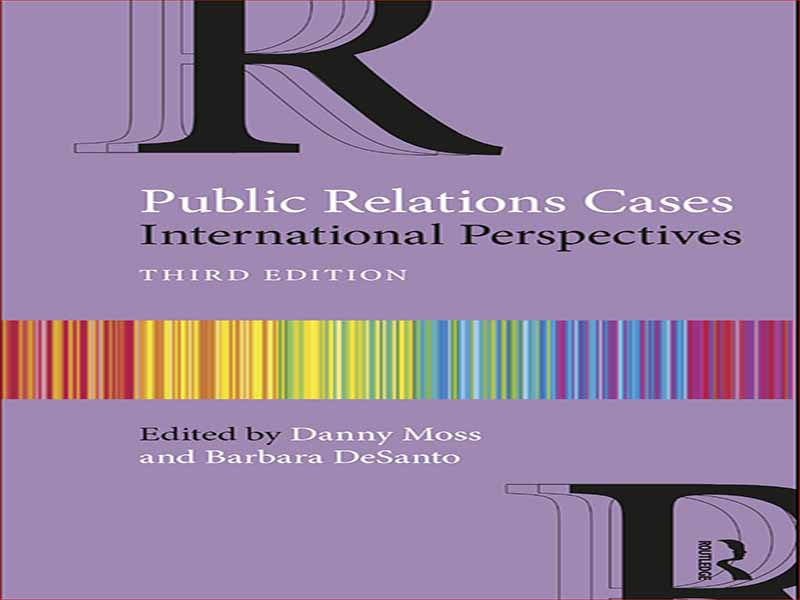- عنوان کتاب: Public Relations Cases – International Perspectives
- نویسنده/انتشارات: Danny Moss
- حوزه: دیپلماسی عمومی
- سال انتشار: 2022
- تعداد صفحه: 155
- زبان اصلی: انگلیسی
- نوع فایل: pdf
- حجم فایل: 10.1 مگابایت
هدف و ارزش این کتاب و هر کتاب مطالعه موردی دیگری چیست؟ خب، پاسخ واضح این است که در بسیاری از زمینهها، از جمله روابط عمومی، مطالعات موردی با دانشآموزان و شاگردان شاغل برای سالها به عنوان مکانیزمی برای اشتراکگذاری و یادگیری از نمونههای عملی در دنیای واقعی استفاده شده است. مطالعات موردی روایت روشنی را پیرامون مجموعه خاصی از شرایط یا سناریوها ارائه میکند که ممکن است از شناسایی مشکل به راهحل راهبرد پیشرفت کند، شاید نشان دهد که چگونه مسیرهای اقدام خاص انتخاب شدهاند، چگونه شرایط خاص بر نتیجه تأثیر گذاشته است، و چگونه تفکر افراد تصمیمها را شکل میدهد. و اقدامات انجام شده از این نظر، مطالعات موردی میتواند بینشهای مفید و گاه ارزشمندی را در مورد اینکه چگونه مجموعههای خاصی از شرایط ممکن است بر رفتار و نتایج سازمانی تأثیر بگذارد، ارائه دهد و در نتیجه بستر مفیدی را ارائه دهد که از آن یادگیری و دانش سازمانی ساخته شود. علاوه بر این، مواردی که یک صنعت یا بخش خاص یا مجموعه خاصی از شرایط را پوشش می دهد – به عنوان مثال. بحرانهای مالی، حوادث بزرگ یا سناریوهای مرتبط با سلامتی، مانند همهگیری ویروس کرونا، ممکن است منجر به برخی دستورالعملهای کمابیش جهانی/عمومی برای مدیریت مؤثرتر چنین حوادثی در آینده شود. اغلب در قلمرو علمی، مطالعه موردی توسط دانشمندان بهعنوان شکلی از آزمایش برای آزمایش و ارائه نظریههای جدید در نتیجه ایجاد فرضیههایی که میتوانند از طریق سناریوهای مطالعه موردی مختلف بررسی شوند، استفاده میشود. شاید امروزی ترین نمونه کار مطالعه موردی که مورد استفاده مهم قرار گرفته است در مطالعه همه گیری ویروس کرونا اخیر باشد، جایی که محققان در سراسر جهان به دنبال درک انتقال ویروس در محیط های مختلف و شامل گروه های جمعیتی مختلف بودند. برای کمک به شناسایی موثرترین راه های مبارزه با شیوع ویروس قبل از شناسایی یک واکسن موثر. چالش اصلی در استفاده از مطالعات موردی بهعنوان یک ابزار یادگیری مؤثر یا برای تحقیق، اطمینان از این است که مورد بهعنوان یک گزارش صرفاً توصیفی از آنچه در هر موقعیت خاص رخ داده باقی نمیماند. در عوض، مهم است که این مورد را بتوان از منظرهای مختلف، از جمله آن ذینفعان داخلی و خارجی، بررسی، زیر سوال برد و تجزیه و تحلیل کرد تا امکان تولید دانش یا بینش اضافی را فراهم کند که ممکن است برای دورههای اقدام و/یا تصمیمهای مشابه در آینده مفید باشد. شرایط/شرایط اغلب مطالعات موردی در ارائه پاسخ به سؤالات «چگونه» و «چرا» مربوط به یک سناریو یا مجموعه ای از رویدادها بسیار مفید هستند. بنابراین، برای مثال، مطالعات موردی بهویژه در بررسی موقعیتهای بحرانی برای درک چگونگی وقوع یک بحران خاص و عواملی که در تشدید بحران یا ایجاد یک رویداد بحرانی مؤثر بودهاند، مفید بودهاند. بسیاری از موارد موسوم به بحران تقریباً برای آموزش عواملی که ممکن است با سناریوهای مشابهی در حرفه خود مواجه شوند تا آنها را برای رویارویی با چنین سناریوهایی بهتر آماده کنند، تبدیل به سهامی در تجارت شده اند. موارد بحران کلاسیک مانند دستکاری جانسون و جانسون تایلنول در سال 1982، انفجار سکوی نفتی پایپر آلفا در دریای شمال در سال 1988، تأثیر طوفان کاترینا در نیواورلئان در سال 2005، و فروپاشی بانک Lehman Brothers در سال 2008، همگی نشان دهنده بحران کلاسیک هستند. مواردی که از نظر خصوصیات بسیار متفاوت هستند، با این حال همه برخی از ویژگی های اصلی سناریوهای بحران را به همراه اصول مدیریت مؤثر بحران (یا نه چندان مؤثر) نشان می دهند. این بینشها در حالت ایدهآل به اطلاعرسانی روشهایی که شرکتها، سازمانها یا دولتها ممکن است برای مقابله با هر موقعیت بحرانی بالقوه مشابهی آماده شوند، کمک میکند. در حالی که سناریوهای بحران همواره توجه رسانهها و عمومی را به خود جلب میکنند، اکثر سازمانها بعید به نظر میرسند که با بحران مهمی مواجه شوند، البته نه به طور منظم. در واقع، در بیشتر موارد، سازمانها ممکن است هرگز با بحران مهمی مواجه نشوند – بحرانی که ممکن است بقای خود سازمان را تهدید کند. با این حال، می توان از موارد مربوط به مجموعه ای از مشکلات یا چالش های سازمانی دیگر مانند مدیریت تغییر، رسیدگی به مسائل عمده منابع انسانی، یا مجموعه ای از سناریوهای بازاریابی که ممکن است با آنها مواجه شود، درس هایی را استخراج کرد. در هر مورد، ممکن است درسهای مهمی برای آموختن وجود داشته باشد که میتواند به جلوگیری از پیامدهای مخربی که ممکن است از تصمیمها یا اقدامات نادرست انتخابی از سوی سازمان ناشی شود، کمک کند. همانطور که قبلاً پیشنهاد شد، همهگیری کروناویروس اخیر (کووید 19) احتمالاً در زمان خود به یک مطالعه موردی کلاسیک تبدیل میشود و بینشهایی را در مورد چگونگی تلاش دولتها، سازمانهای پزشکی و رسانهها در سراسر جهان برای واکنش نسبتاً مؤثر ارائه میدهد، یا نه. به طور موثر، برای جلوگیری از گسترش ویروس.
What is the purpose and value in this and any other case study book? Well the obvious answer is that in many fields, including public relations, case studies have been used with student and practitioner learners for many years as a mechanism for sharing and learning from real-world practical examples. Case studies provide a clear narrative surrounding a particular set of circumstances or scenarios that may progress from problem identification to strategy solution, perhaps illustrating how particular courses of action were chosen, how particular circumstances affected the outcome, and how the thinking of individuals shaped the decisions and actions taken. In this sense, case studies can offer useful and sometimes invaluable insights into how particular sets of circumstances may affect organisational behaviour and outcomes, and thereby offer a useful platform from which organisational learning and knowledge can be built. Moreover, cases covering a particular industry or sector or specific set of circumstances – e.g. financial crises, major accidents, or major health-related scenarios, such as the coronavirus pandemic, may give rise to some more or less universal/generic guidelines for handling such incidents more effectively in the future. Often in the scientific realm, case study is used by scientists as a form of experi-mentation to test and come up with new theories as a result of developing hypotheses that can be explored through different case study scenarios. Perhaps the most con-temporary example of case study work being put to important use is in the study of the recent coronavirus pandemic, where researchers around the world sought to under-stand the transmission of the virus across different settings, and involving different demographic groupings to help identify the most effective ways of combating the spread of the virus ahead of the identification of an effective vaccine. The chief challenge in using case studies as an effective learning tool or for research is to ensure the case does not remain as a purely descriptive account of what happened in any particular situation. Rather, it is important that the case can be probed, questioned, and analysed from many different perspectives, including those internal and external stakeholders, to enable the generation of additional knowledge or insight that might benefit future courses of action and/or decisions involving similar circumstances/con-ditions. Often case studies are seen as particularly useful in providing answers to the ‘how’ and ‘why’ questions relating to a particular scenario or set of events. Thus, for example, case studies have been particularly useful in examining crisis situations to understand how a particular crisis unfolded and the factors that contributed to the escalation of the crisis, or to the instigation of a crisis event. Many of the so-called crisis cases have become almost ‘stock in trade’ for the training of operatives who might encounter similar scenarios in their careers to better prepare them to deal with such scenarios. Classic crises cases such as the Johnson & Johnson Tylenol tampering in 1982, Piper Alpha oil rig explosion in the North Sea in 1988, the impact of Hurricane Katrina in New Orleans in 2005, and the collapse of Lehman Brothers bank in 2008 all represent classic crisis cases that are very different in character, yet all illustrate some core characteristics of crisis scenarios along with the principles of effective (or not so effective) crisis management. These insights ideally will help inform the way in which firms, organisations, or governments might best prepare to deal with any similar potential crisis situations. While crisis scenarios invariably attract strong media and public attention, most organisations are unlikely to encounter a significant crisis, certainly not on a regular basis. Indeed, in most cases, organisations may never encounter a significant crisis – one that may threaten the very survival of the organisation itself. However, it is possible to draw on lessons from cases concerned with a whole array of other organisational problems or challenges such as managing change, handling major HR issues, or an array of marketing scenarios that may be encountered. In each case, there may be important lessons to be learned that can help avoid the sort of damaging outcome that might result from poor choice decisions or actions on the part of the organisation. As suggested earlier, the recent coronavirus (Covid19) pandemic is likely to become a classic case study in its own right in time, offering insights into how governments, medical organisations, and the media around the world sought to respond relatively effectively, or not so effectively, to stem the spread of the virus.
این کتاب را میتوانید از لینک زیر بصورت رایگان دانلود کنید:
Download: Public Relations Cases – International Perspectives



































نظرات کاربران